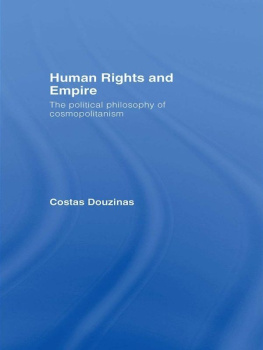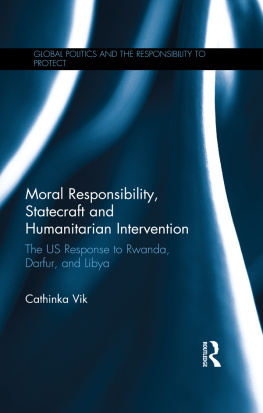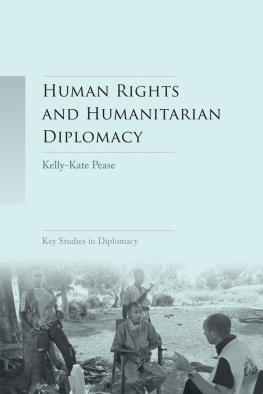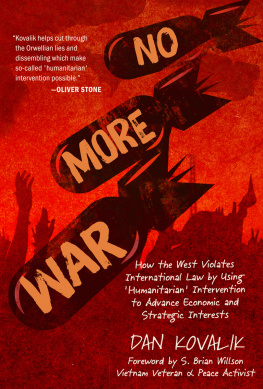Thank you for buying this ebook, published by NYU Press.
Sign up for our e-newsletters to receive information about forthcoming books, special discounts, and more!
Sign Up!
About NYU Press
A publisher of original scholarship since its founding in 1916, New York University Press Produces more than 100 new books each year, with a backlist of 3,000 titles in print. Working across the humanities and social sciences, NYU Press has award-winning lists in sociology, law, cultural and American studies, religion, American history, anthropology, politics, criminology, media and communication, literary studies, and psychology.
Humanitarian Imperialism
Humanitarian Imperialism
Using Human Rights to Sell War
Jean Bricmont

Copyright 2006 by Jean Bricmont
All Rights Reserved
Library of Congress Cataloging-in-Publication Data
Bricmont, J. (Jean)
[Imprialisme humanitaire. English]
Humanitarian imperialism : using human rights to sell war / by Jean Bricmont; translated by Diana Johnstone
p. cm.
Includes bibliographical references and index.
ISBN 1-58367-147-1 (alk. paper)
1. Humanitarian intervention. 2. Intervention (International law)History. 3. Humanitarian interventionPolitical aspects. 4. Humanitarian interventionMoral and ethical aspects. 5. Human rights. 6. WarMoral and ethical aspects. I. Title.
KZ6369.B7513 2006
341.584-dc22
2006034221
Designed by Terry J. Allen
MONTHLY REVIEW PRESS
146 West 29th street, Suite 6W
New York, NY 10001
Table of Contents
Preface to the English Edition
Two sorts of sentiments inspire political action: hope and indignation. This book is largely the product of the latter sentiment, but the aim of its publication is to encourage the former. A brief and subjective overview of the political evolution of the past twenty years can explain the source of my indignation.
The collapse of the Soviet Union can be compared to the fall of Napoleon. Both were the product of major revolutions whose ideals they symbolized, rightly or wrongly, and which they defended more or less effectively while betraying them in various ways. If their natures were complex, the consequences of their fall were relatively simple and led to a general triumph of reaction, with the United States today playing a role analogous to that of the Holy Alliance nearly two centuries ago. A discussion of the causes of these failures would require several books. Suffice it to say that for all sorts of reasons, some of which will be touched on in what follows, I did not follow the evolution of the majority of my generation and have preserved what it would call my youthful illusions, at least some of them.
And so, when the Kosovo war began in 1999,1 found myself completely isolated. To the right, there were still a few realpolitikers who saw no good reason for France to wage war against Serbia, least of all to please Germany and the United States. But on the left, the concept of humanitarian intervention was accepted almost unanimously, even within organizations that had retained revolutionary labels, whether Trotskyist, communist, or anarchist. Even today (in August 2006), the movement against the occupation of Iraq is weak and opposition to the threat of war against Iran is weaker still.
In reaction to all that, in 1999 I began writing texts diffused mainly by the Internet, sometimes published here and there. But inasmuch as those texts were often polemic and linked to particular events, I decided, partly in response to various objections encountered in the course of debates, to bring together in a single book my arguments against Western interventionism and its humanitarian justifications. This book was written initially for a European public, but having lived and worked in the United States, I am convinced that it could also be of interest to an American public, for two reasons: for one, because it provides a glimpse of what is going on in Europe, especially in the progressive and ecological circles often idealized by the American left; and for another, because the ideological weaknesses of the movements of opposition to imperial wars are the same on both sides of the Atlantic.
One of the readers of the French edition of this book remarked to me that it was a critique of the left, but one not made from a right-wing viewpoint, which is a fairly good description of what I meant to do. Let us say that the intention here is to make a modest contribution to an ideological reconstruction of the left. Everyone admits that it is weak and, in my view, it is weak, partly because it has not come up with a proper intellectual response to the ideological offensive waged by the right after the fall of communism and has, on the contrary, much too thoroughly interiorized the arguments advanced by the right in the course of that campaign. In this preface, I want to make a few remarks explaining how the arguments made in this book fit into the broader perspective of what could be meant by an intellectual reconstruction of the left.
Historically, one can consider that the left represents roughly three types of combat:
For social control of production, ranging from defense of workers to establishment of different forms of ownership of the means of production other than private.
For peace, against hegemony, imperialism and colonialism.
For the defense of democracy, of the rights of the individual, of gender equality, of minorities and of the environment.
Of course, it is perfectly possible to be on the right in one of those categories and on the left in another. In particular, a good part of the modern right defends the free market, that is, private ownership of the means of production, while professing moderately left positions in the third category mentioned above. Moreover, the isolationist, libertarian or realistic right often espouses quite anti-imperialist positions while maintaining views extremely opposed to those of the left on the other points. Besides that, there is a difference betweeen the old left, meaning the communist movement but also most of the rest of the left up until the mid-1960s, which emphasized the first two aspects while underestimating and sometimes completely ignoring the third, and the new left, which focused its main attention on the third aspect, all too often to the detriment of the first two.
Even if one recognizes the validity of the criticism that the new left addressed to the old left, it is possible to conclude that, on certain problems, the baby has been thrown out with the bathwater. Concerning the first issue, that of social control of the economy, the movement against corporate globalization has been the sign of a reawakening to its fundamental nature. But, when it comes to the subject of this book, the reaction to hegemony and imperialism, the renewal remains feeble, even if the war in Iraq has shown just what sort of disasters result from the intervention policy.
To simplify, one can say that the new left has had the tendency, faced with Western intervention, to waver between two attitudes:
that which I call humanitarian imperialism, which concedes much too much to the idea that our universal values give us the right and even the duty to intervene elsewhere and which opposes imperial wars weakly or not at all. The critique of these ideas is our subject here.
cultural relativism, that is, the idea that there is no such thing as a moral position having universal value and in whose name one can objectively judge other societies and cultures (or our own).
Next page











